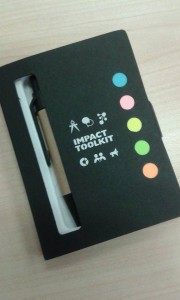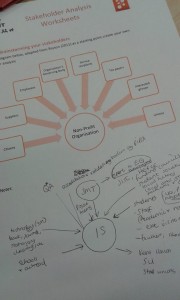Our Impact Toolkit LibChat on 2nd November 2015 was presented by Juanita Foster-Jones, who is a Development Officer (VLE) that works with Regional Member Networks, Special Interest Groups and external suppliers to develop resources for CILIP’s VLE.
The Impact Toolkit can be found online and offers practical ways for information professionals to demonstrate their value and the impact of their services to stakeholders. It is divided between two areas, the first ‘understanding value’ and the second ‘communicating value’. It was launched at the CILIP conference and is available to all CILIP members. Here is a link to further information on accessing the Impact Toolkit: http://www.cilip.org.uk/cilip/membership/benefits/virtual-learning-environment-vle/impact-toolkit At the conference in Liverpool, delegates were each given a little black book with a pen and sticky markers (see image), which can be used to record your impact on a daily basis.
There are six courses which help you to demonstrate your value as a service. The courses can be completed in order or you can select those of most interest to you. Each course includes activities, readings, a discussion forum, videos and worksheets. The worksheets are important for those who prefer a physical record of their learning and can be useful for chartership or revalidation evidence.
After an introduction to the Toolkit and its aims, we divided into small groups to tackle the Stakeholder activity (see image). Using a worksheet, we discussed who the key decision-makers in our organisations were and who accessed our service. Each group then contributed examples of stakeholders which Juanita wrote on the board. This exercise neatly led to Juanita’s next question, how much do the key decision-makers, those who have power over your future as a service, know about what you do as a service and as individuals? How well do they understand the services that we provide? One example would be online services, which stakeholders only recognise as a service managed by professionals when it is not working successfully. We then took part in a second activity, mapping the expectations of a stakeholder. Ways of discovering their expectations can include looking at the language they use in their official statements or in the case of users, by creating surveys and focus groups.
Juanita advised that as a service you should compare your aims with those of the larger organisation. What are you doing that contributes to the organisation’s strategic aims and how are you showing this to key stakeholders? The information profession is not so good at communicating the work that is often completed behind the scenes. Juanita emphasised that we should show that this invisible service is achieved by professionally trained staff. Stakeholders need to hear about the value of the service and the Toolkit provides guidance on how to achieve this.
Juanita concluded her LibChat by asking for any feedback on our experiences of using the Toolkit. These can be added to the online CILIP VLE discussion forum or by tweeting comments using these tags: #impacttoolkit #cilipvle. The future of the Toolkit includes a review and new courses including one on electronic surveys and another on designing impact forms. We should also keep a lookout for an article which will appear in CILIP’s Update magazine soon.
Lynsey Blandford



